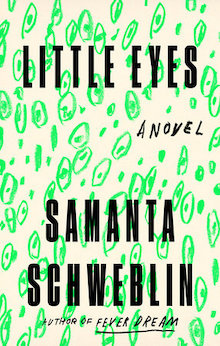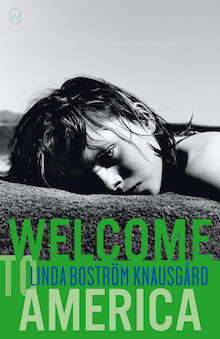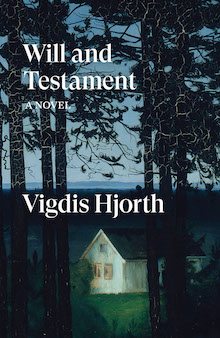Homestead Horror and Genealogical Angst [BTBA 2020]
This week’s Best Translated Book Award post is from Justin Walls, a bookseller with Powell’s Books in Portland, Oregon who can be found on Twitter @jaawlfins.
 Psychological horror/thriller/chiller/etc.—you know the sort, taut with spring-loaded tension and positively oozing dread—is tricky to pull off in a work of literature, let alone to sustain over the course of an entire novel. Anything containing too much gory mayhem runs the risk of being slapped with the genre label (Quelle horreur, indeed!), while taking too cerebral a tack could attract the charge that nothing “happens.” An effective workaround in the current milieu of literary scares is to aim for the unsettling, à la expert spine-tingler Samanta Schweblin, whose forthcoming Little Eyes (trans. Megan McDowell, Riverhead Books) will arrive with just such claims already embedded in its jacket copy. (See also: Guadalupe Nettel’s Bezoar: And Other Unsettling Stories, translated by Suzanne Jill Levine, due out from Seven Stories Press later this year.) Think of the infamous diner scene from David Lynch’s Mulholland Dr. (2001), a startling encounter with the inexplicable that upends all previous notions of what might happen from one moment to the next. It’s no wonder that, like “unsettling,” the term “Lynch-ian” has pretty much had the tread worn off its tires as far as bookish buzzwords are concerned. This method, essentially, takes reality and makes it unreal.
Psychological horror/thriller/chiller/etc.—you know the sort, taut with spring-loaded tension and positively oozing dread—is tricky to pull off in a work of literature, let alone to sustain over the course of an entire novel. Anything containing too much gory mayhem runs the risk of being slapped with the genre label (Quelle horreur, indeed!), while taking too cerebral a tack could attract the charge that nothing “happens.” An effective workaround in the current milieu of literary scares is to aim for the unsettling, à la expert spine-tingler Samanta Schweblin, whose forthcoming Little Eyes (trans. Megan McDowell, Riverhead Books) will arrive with just such claims already embedded in its jacket copy. (See also: Guadalupe Nettel’s Bezoar: And Other Unsettling Stories, translated by Suzanne Jill Levine, due out from Seven Stories Press later this year.) Think of the infamous diner scene from David Lynch’s Mulholland Dr. (2001), a startling encounter with the inexplicable that upends all previous notions of what might happen from one moment to the next. It’s no wonder that, like “unsettling,” the term “Lynch-ian” has pretty much had the tread worn off its tires as far as bookish buzzwords are concerned. This method, essentially, takes reality and makes it unreal.
However, recent entries into the canon of cinematic terror, like Ari Aster’s Hereditary (2018) or Jordan Peele’s Us (2019), suggest a shift in what we as a culture deem hair-raising. A hyper-reality borne of not just fright but ambient stress and buried trauma, centered around the family, has acquitted itself as a convincing boogeyman for contemporary America. Even in Robert Eggers’ deliciously demonic The Witch (2015), the devil himself opts to sow seeds of suspicion in the hearth of an ousted Puritanical clan, pitting mother against daughter and infant against goat (or something like that). Sure, there’s no shortage of bloodletting in these films, but the true innards-twisting aspect of each lies not with any amount of over-the-top slasher theatrics. Instead, it’s the permeating sensation that something—specifically something close to home—isn’t right.
 For fiction that addresses a similar strain of homestead horror and genealogical angst, we must turn to two 2019 Nordic novels in translation: Linda Boström Knausgård’s Welcome to America (World Editions), translated by Martin Aitken, and Vigdis Hjorth’s Will and Testament (Verso Fiction), translated by Charlotte Barslund. Both are attuned to the complex contaminants that can burble to the surface among relatives and loves ones, especially where grief is involved. From Nicolas Roeg’s Don’t Look Now (1974)—which Lynch ripped off for the aforementioned Mulholland Dr. scene, if we’re being honest—to Lars von Trier’s Antichrist (2009) to Aster’s Midsommar (2019), a death in the family remains fertile ground for exploring our inherent fears.
For fiction that addresses a similar strain of homestead horror and genealogical angst, we must turn to two 2019 Nordic novels in translation: Linda Boström Knausgård’s Welcome to America (World Editions), translated by Martin Aitken, and Vigdis Hjorth’s Will and Testament (Verso Fiction), translated by Charlotte Barslund. Both are attuned to the complex contaminants that can burble to the surface among relatives and loves ones, especially where grief is involved. From Nicolas Roeg’s Don’t Look Now (1974)—which Lynch ripped off for the aforementioned Mulholland Dr. scene, if we’re being honest—to Lars von Trier’s Antichrist (2009) to Aster’s Midsommar (2019), a death in the family remains fertile ground for exploring our inherent fears.
 In Boström Knausgård’s Welcome to America, we’re introduced to Ellen, a newly non-verbal tween convinced that she’s colluded with God in a plot to murder her mentally unstable and frequently menacing father. Rather than address these worrisome notions via whatever passes for conventional methods, Ellen’s actress mother becomes ebullient and distant, her brother adopts a posture of physical intimidation, and our eleven-year-old patricide collaborator recedes into a chrysalis of torment. There is an atmospheric disquietude reminiscent of Roman Polanski’s Repulsion (1965) or Ingmar Bergman’s Persona (1966) to the novel, a hallucinatory netherworld crafted from isolation. Echoing Catherine Deneuve’s confinement in the former and Liv Ullmann’s silence in the latter, Welcome to America’s troubled narrator possesses all the makings of a budding woman on the brink. A spiritual successor to the vanishing girls of Peter Weir’s Picnic at Hanging Rock (1975), Ellen slips through a geological recess of the mind, simultaneously trekking further out while burrowing deeper in. The bog of doubt, delusion, and scattered dreams she discovers there is as haunting as anything in modern fiction.
In Boström Knausgård’s Welcome to America, we’re introduced to Ellen, a newly non-verbal tween convinced that she’s colluded with God in a plot to murder her mentally unstable and frequently menacing father. Rather than address these worrisome notions via whatever passes for conventional methods, Ellen’s actress mother becomes ebullient and distant, her brother adopts a posture of physical intimidation, and our eleven-year-old patricide collaborator recedes into a chrysalis of torment. There is an atmospheric disquietude reminiscent of Roman Polanski’s Repulsion (1965) or Ingmar Bergman’s Persona (1966) to the novel, a hallucinatory netherworld crafted from isolation. Echoing Catherine Deneuve’s confinement in the former and Liv Ullmann’s silence in the latter, Welcome to America’s troubled narrator possesses all the makings of a budding woman on the brink. A spiritual successor to the vanishing girls of Peter Weir’s Picnic at Hanging Rock (1975), Ellen slips through a geological recess of the mind, simultaneously trekking further out while burrowing deeper in. The bog of doubt, delusion, and scattered dreams she discovers there is as haunting as anything in modern fiction.
 Meanwhile, Hjorth’s comparatively cogent Will and Testament resembles Henri-Georges Clouzot’s The Wages of Fear (1953) with the nitroglycerin swapped out for the phrase “cabin valuations.” This diabolical bit of legalese dredges forth all manner of curdled resentment after being invoked one too many times — yes, like how Beetlejuice functions in Beetlejuice (1988) or Candyman in Candyman (1992), exactly — and thrusts black sheep Bergljot back into the familial fray. There’s another felled patriarch, another trail of abuse, but whereas adolescent Ellen is left to merely cope following her father’s passing, grown-ass Bergljot confronts her trauma with the advantage of resolute indignation and abundant hindsight. When the matter of the inheritance goes sour, the surviving family members split into competing factions: those who believe that the trespass occurred and those who, for various reasons, feel compelled to deny, deny, deny. What follows is a free-for-all rhetorical chess match marked by passive aggression, suppression, grievance, subterfuge, and bad faith diplomacy. Like Audrey Hepburn’s sightless protagonist in Terence Young’s Wait Until Dark (1967), Bergljot must fend off attempts to undermine what she knows to be the truth. (A certain Mia Farrow character can also totally relate.) The slow burn of steadily accumulated anxiety, increasing with every perceived slight and cutting remark, is enough to leave you tied up in sympathetic knots. That is, if you can bear to watch.
Meanwhile, Hjorth’s comparatively cogent Will and Testament resembles Henri-Georges Clouzot’s The Wages of Fear (1953) with the nitroglycerin swapped out for the phrase “cabin valuations.” This diabolical bit of legalese dredges forth all manner of curdled resentment after being invoked one too many times — yes, like how Beetlejuice functions in Beetlejuice (1988) or Candyman in Candyman (1992), exactly — and thrusts black sheep Bergljot back into the familial fray. There’s another felled patriarch, another trail of abuse, but whereas adolescent Ellen is left to merely cope following her father’s passing, grown-ass Bergljot confronts her trauma with the advantage of resolute indignation and abundant hindsight. When the matter of the inheritance goes sour, the surviving family members split into competing factions: those who believe that the trespass occurred and those who, for various reasons, feel compelled to deny, deny, deny. What follows is a free-for-all rhetorical chess match marked by passive aggression, suppression, grievance, subterfuge, and bad faith diplomacy. Like Audrey Hepburn’s sightless protagonist in Terence Young’s Wait Until Dark (1967), Bergljot must fend off attempts to undermine what she knows to be the truth. (A certain Mia Farrow character can also totally relate.) The slow burn of steadily accumulated anxiety, increasing with every perceived slight and cutting remark, is enough to leave you tied up in sympathetic knots. That is, if you can bear to watch.

Leave a Reply